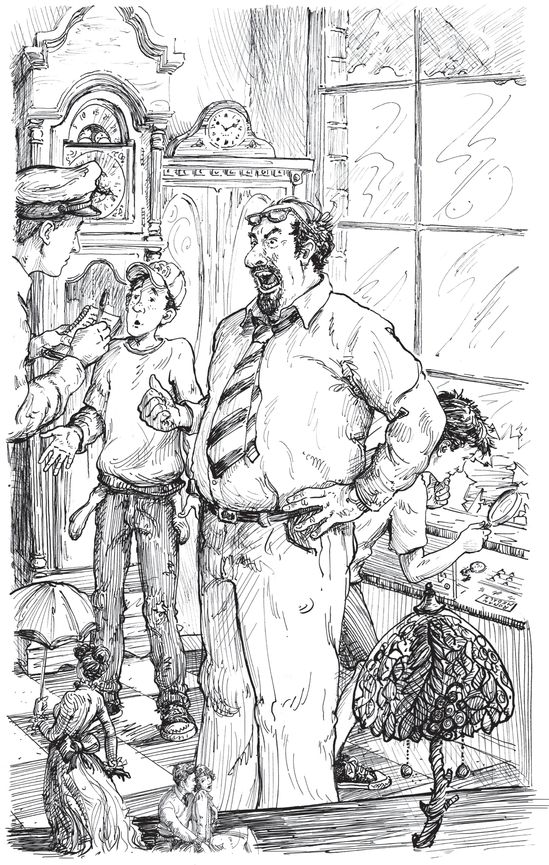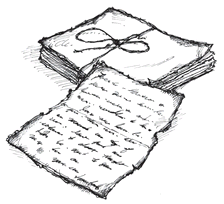Encyclopedia Brown and the Case of the Secret UFOs (5 page)
Read Encyclopedia Brown and the Case of the Secret UFOs Online
Authors: Donald J. Sobol

BOOK: Encyclopedia Brown and the Case of the Secret UFOs
2.29Mb size Format: txt, pdf, ePub
The Den of Antiquities was on a side street near the harbor. It had a fancy dark green sign with gold lettering above the entrance.
Roger Cuthbert was standing out front. He was holding Winslow Brant roughly by the arm.
What's Winslow doing here? Encyclopedia wondered.
Winslow Brant was Idaville's master snooper. The city dump was his home away from home, and he had never met a trash barrel he didn't like. Moreover his snooping had a purpose. He could see value in other people's junk. He could find an antique needle in a haystack if he knew he could sell it at a profit.
Chief Brown and Encyclopedia got out of the squad car.
“Thank goodness you're here, Chief,” said Mr. Cuthbert. “I caught this young scoundrel in the act.”
“Mr. Cuthbert, let's back things up a little,” said Chief Brown, “and I think you can let go of Winslow. He's not going anywhere. Are you, Winslow?”
“No, sir.”
“Why don't we continue this conversation inside?” said Chief Brown. “Watch your step everyone. Stay clear of the broken glass.”
Inside the shop, Encyclopedia took a careful look around. The shelves were lined with small clocks, carved wooden boxes, porcelain figurines, brass lamps, and other collectibles. On the floor were a spinning wheel, spindle-backed chairs, some rolled-up oriental rugs, and a few small tables.
“Tell me what happened,” said the chief, taking out his notebook.
“I had closed up for the day,” Mr. Cuthbert said, “and was updating my accounts. I still had some work to do, but I decided to get a cup of coffee at the restaurant around the corner. I was only gone a few minutes. When I got back, this boy was standing in front of my shop, and one of my windows was broken.” He pointed to the broken glass on the sidewalk. “See that display case inside the window? I had three ancient Roman medals, called medallions, there. Now they're gone.”

“When I got back, this boy was standing in front of my shop, and one of my windows was broken.”
“I didn't take them,” said Winslow. “I'm innocent.”
“Oh, really?” said Mr. Cuthbert. “Were you innocent earlier this afternoon when you came into my shop?”
“I was just curious,” said Winslow. “The shop has a lot of nice things.”
“Especially the medallions,” said Mr. Cuthbert. “Do you deny asking to hold them?”
“No,” said Winslow.
“Where are they now?” asked Mr. Cuthbert.
“I don't know,” said Winslow. “All I did was come by for another look. When I got here, the window was broken and the medallions were gone.”
“Will you empty your pockets, Winslow?” Chief Brown said.
Winslow did as he was asked. He took out three bottle caps, a rusty skate key, and a bottle opener.
“Is that all?” asked the chief.
“Not quite,” said Winslow. From his other pocket he took out a fountain pen and a bent spoon. “I did some collecting on the way here,” he explained.
“No medallions, though,” said Encyclopedia.
“That proves nothing,” said Mr. Cuthbert. “Maybe he stashed them somewhere before I grabbed him. Or maybe he had a partner in crime.”
“Is anything else missing?” the chief asked.
Mr. Cuthbert glanced around the shop. “I can't be sure without a thorough examination. It doesn't look like the rest of the shop was disturbed.” He pointed a finger at Winslow. “He knew exactly what he wanted.”
“How valuable were the medallions?” the chief asked.
“Taken together? Perhaps a few thousand dollars,” Mr. Cuthbert replied.
Winslow whistled. “I've never found anything like that at the dump.”
“No, I imagine you wouldn't,” Mr. Cuthbert said. “That's why you robbed me. I caught you red-handed, boy. You watched me leave for the restaurant. You came up to the window. Maybe you hesitated at the last second, I don't know. Whatever, the lure of the medallions was too strong for you. You broke the window, reached in, and stole them.”
“Winslow's always made his money fair and square,” said Encyclopedia.
“Only because he's never been tempted before,” said Mr. Cuthbert.
“Don't you worry,” said Chief Brown. “I'll get to the bottom of this.”
“As far as I'm concerned, the case is closed,” Mr. Cuthbert said. “Now, if you don't mind, I have some plywood in the back that I can use to board up that window until I can get it fixed. If you could just wait here while I get it, I'd feel much safer.”
“Of course,” said Chief Brown. He closed his notebook as Mr. Cuthbert disappeared. “It doesn't look good, Winslow.”
“I never stole anything,” Winslow said glumly.
Encyclopedia had closed his eyes to think. Now he opened them. “Actually,” he said, “I have a pretty clear idea who the thief is now.”
“You mean you've cracked the case?” said his father.
“You could say exactly that,” said Encyclopedia.
Â
WHO WAS GUILTY OF THE THEFT?
Â
Â
Â
Â
Â
Â
(Turn to page 82 for the solution to “The Case of the Missing Medallions.”)
The Case of the Shipwreck

Sally fanned herself because of the heat in the Brown Detective Agency.
“We ought to open a branch office at the beach,” she said. “I'm sure the beach has mysteries all the time.”
“It's a thought,” Encyclopedia said.
“We could be missing out on something big,” Sally insisted.
Encyclopedia went so far as to say only, “The heat must be the record for this day of the month.”
“If the temperature goes up another degree, I'm going to melt,” Sally said, and took a swig of bottled water.
Penny Nichols, a fourth grader, came up the driveway. “Thank goodness you're here!” she declared. “I was afraid you might be at the beach trying to beat the heat.”
“We would be if we had any sense,” Sally said.
“What can we do for you?” Encyclopedia asked.
Penny laid a quarter on the gasoline can. She didn't let go of it, though, not for a second. Penny didn't part with her money easily.
“We're hired,” said Sally. “Tell us the problem.”
“Wilford Wiggins has a once-in-a-lifetime opportunity for anyone with a little extra cash,” Penny informed them
“Wilford?” Encyclopedia groaned. “Oh, not Wilford again!”
Wilford Wiggins was a high school dropout and as peppy as a pillow. He couldn't stand to watch people work before noon.
“I'm saving myself until something important comes up,” he explained.
His chief exercise was trying to swindle the little neighborhood kids out of their savings. Happily, Encyclopedia was there to halt his phony big deals. Only last week the detective had stopped him from collecting money to manufacture a new-car smell. It was for people who want to smell like a new car.
“Wilford is holding a secret meeting today at five o'clock at the city dump. It's just for little kids,” Penny said.
“It's nearly five now,” Sally said. “We better get going if we want to hear his latest big deal.”
When they got to the dump, a crowd of about twenty little kids was waiting, eager to learn how they could get rich quick.
Wilford stood on a rusted washing machine. “Gather round. Hurry, hurry, hurry. Time is money. I'm glad all my little friends could make it. Your faith in me will be rewardedâif you tell no one. I don't want grown-ups reaching the treasure first.”
The children made anxious noises, fearful for the money they didn't yet have.
“Your treasure is safe if you don't speak of it,” Wilford said. “Loose talk is dangerous.” He motioned the children to come closer. “I have an uncle who lives down at the southern tip of South America. Last week it was really hot there, kind of like today. He went to the beach to cool off.”
“Smart man,” Sally muttered.
“He was standing at the edge of the water,” Wilford continued, “when a sea chest washed up onto the shore. The chest held tools and several gold coins. My uncle is convinced there's a shipwreck nearby. It could be a pirate ship or one of those treasure galleons that sailed the waters hundreds of years ago. Considering the coins he found, he figures there's a fortune on board. It's waiting at the bottom of the sea.”
A scattering of “Ooohs” and “Ahhhs” rose from the children.
“I got excited, too, when I first heard my uncle talk about a wreck,” Wilford confessed. “He said a lot of ships went down in those parts during the 1600s and 1700s. Spanish ships and ships of other countries sailed there loaded with gold bars, coins, and jewels worth millions, and sank.”
“I have a question,” Penny asked. “Wouldn't it be easier for your uncle to borrow money from grown-ups he knows?”
“An excellent question,” Wilford said. “I asked him the same thing. He explained that if he tells anybody about the sea chest, they'll start looking for the ship themselves. So he has to keep it a secret. That's when he thought of me. He figures that his secret is safe this far away. At the moment, he doesn't have the money to hunt the ship. He hopes he can still get the money he needs from me and my loyal little friends.”
“Why don't you loan him the money yourself?” asked a boy.
“My money is tied up in oil wells,” said Wilford. “So I'll tell you what I'm going to do. I'm going to make you rich beyond your wildest dreams. Buy a share in the sunken treasure ship for a measly five dollars. It will return you ten times or even a hundred times that amount when my uncle finds the ship.”
Ten times! A
hundred
times!
hundred
times!
The crowd of children buzzed with excitement.
“What do you think, Encyclopedia?” Sally asked.
The boy detective shook his head. “I think Wilford's shipwreck won't hold water,” he said.
Â
WHAT WAS THE CLUE?
Â
(Turn to page 83 for the solution to “The Case of the Shipwreck.”)
The Case of Mrs. Washington's Diary

The Idaville flea market was open every Saturday in the summer. It was held in the vacant field behind the library. The vendors sold everything from secondhand furniture to old sets of china and silver.
Encyclopedia and Sally were moving slowly down one of the aisles, checking out things in the different booths. They passed leather-bound books and old maps of different states.
“There has to be something here,” said Sally. “I'll know it when I see it.”
“Don't worry,” said Encyclopedia. He turned over a cut-glass bowl.
Other books
Stay Forever by Corona, Eva
Is This Apocalypse Necessary? - Wizard of Yurt - 6 by C. Dale Brittain
A Caress of Wings by Sylvia Day
A Bad Man by Stanley Elkin
This Hero for Hire by Cynthia Thomason
The World at Night by Alan Furst
Hansel and Gretel by Jenni James
All Due Respect Issue 2 by Owen Laukkanen
Losing Angeline: London Calling Book Two by Kat Faitour